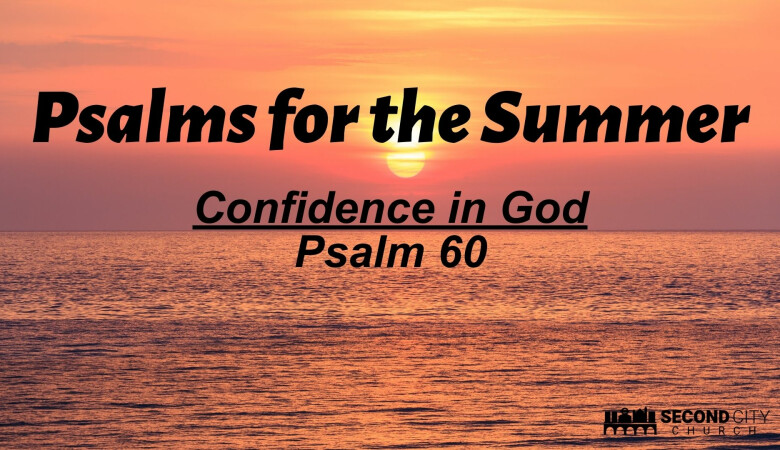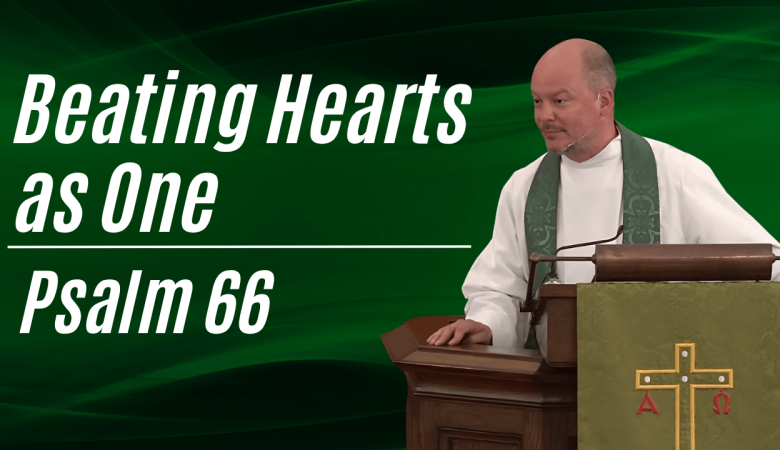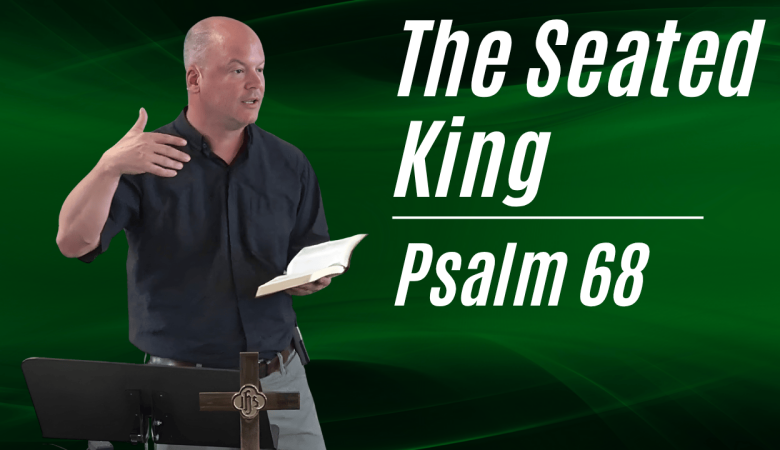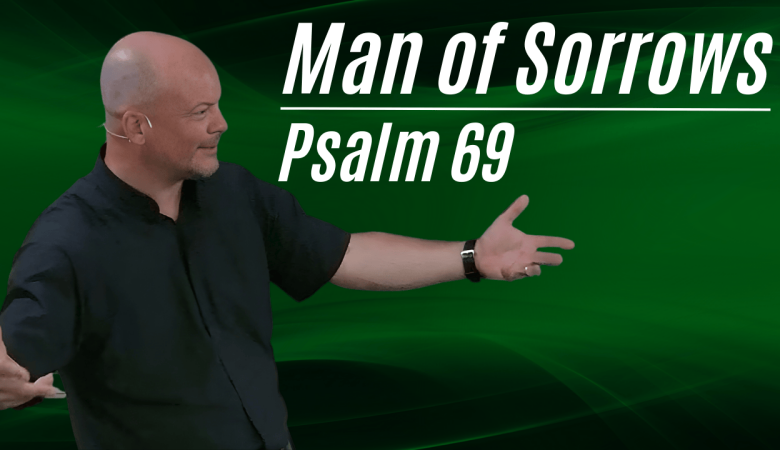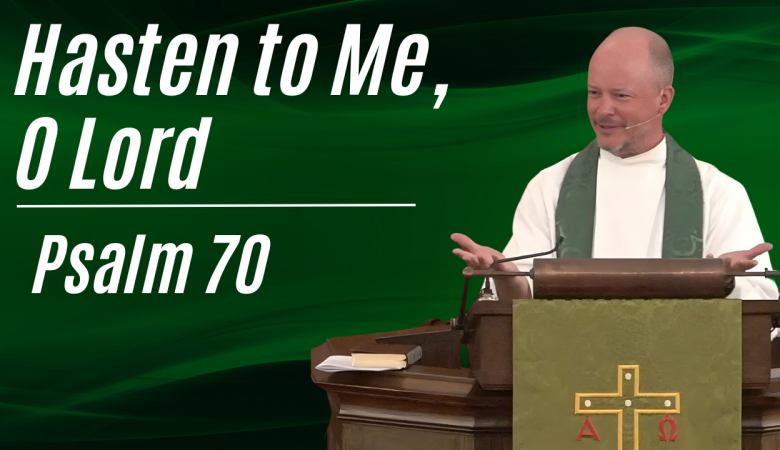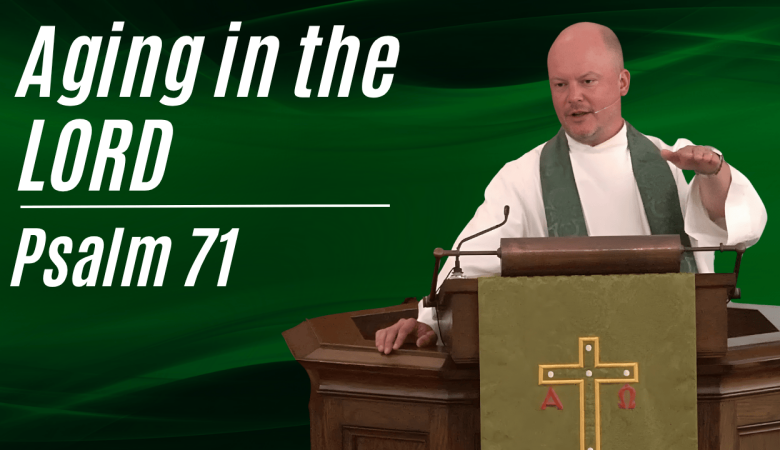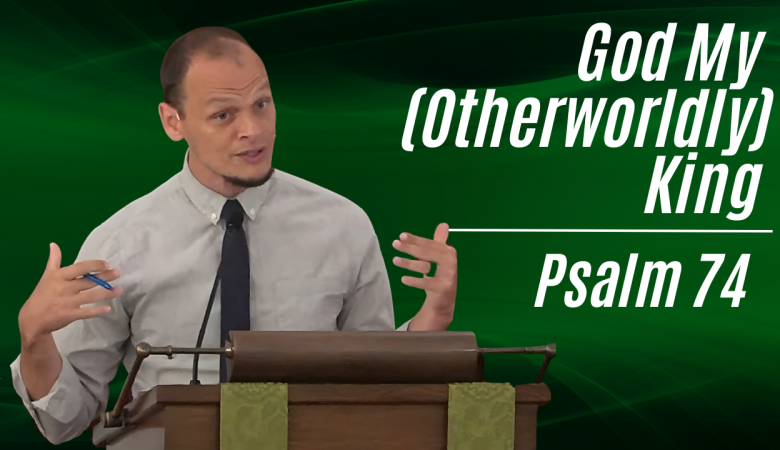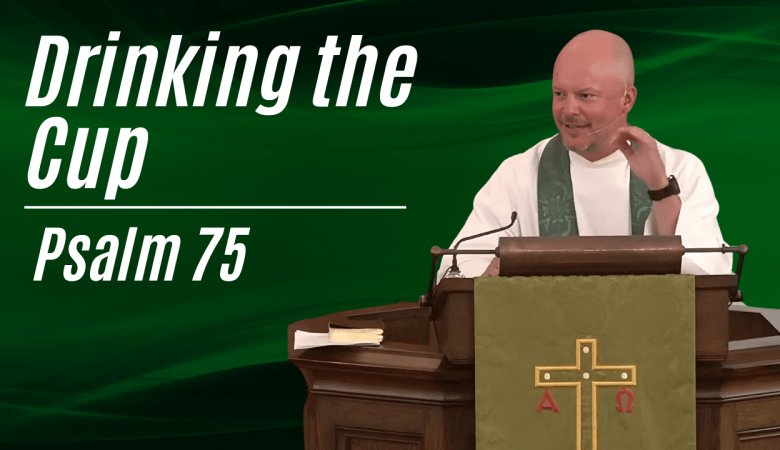Series: Psalms for the Summer
Heart Health
August 10, 2025 | Jed Stalker
Passage: Psalms 73:1-28
Summary
Psalm 73 addresses a universal human struggle: the spiritual heartache we experience when we see wrongdoers prospering while the righteous suffer. The psalmist's journey from bitter envy to profound trust offers a roadmap for finding peace in an unjust world. The real danger isn't external threats but internal spiritual misalignment - when our hearts become sick with envy and distrust of God's goodness.The path to spiritual heart health involves three key elements: reality, routine, and relationship. Reality means honestly confronting our feelings while examining their true causes - often our envy reveals a secret desire for worldly success rather than godly character. Routine refers to the healing power of worship, as the psalmist's turning point came when entering God's sanctuary. Corporate worship reorients our perspective, helping us see beyond temporary circumstances to eternal realities. Finally, relationship with God provides the ultimate cure for envy. When we find our satisfaction in God Himself rather than comparing ourselves to others, we can declare with the psalmist that even when our flesh and heart fail, God remains our strength and portion forever. Jesus Christ, who lived righteously yet suffered greatly, stands as our ultimate example that God's favor isn't measured by worldly prosperity.
Transcript
Let's pray together. Oh Lord God, we thank you for your goodness to us. You are good and your mercy endures forever. We pray, Lord, that you would be with Peter, our pastor and his family as they vacation. We pray that you would be with all of our loved ones who are not here today. And we pray for those of us who are here. Speak to us today in your word and by your sacrament, Lord, help us to know you and love you better now. May the words of my mouth and the meditation of all of our hearts be pleasing in your sight, O Lord, our rock and our Redeemer. Amen.
All right. Hello all. Psalm 73 is a poem in which the speaker expresses indignation against the bad guys who appear to just get away with everything. There appears to be no justice in the world for the speaker of the poem. And I resonate strongly with this because I am a football fan and for years and years the New England Patriots kept getting into scandal after scandal and kept getting away with it and winning Super Bowls. There was no justice in the world. The NFL fan looked up. And behold, in place of righteousness and truth, there was Tom Brady deflating footballs.
Let me read you some of Psalm 73 as I would have read it not long ago in my own spiritual life. Please follow along with the ESV in your pew for reference. So this is starting with verse 3. For I was envious of the arrogant when I saw the prosperity of the Patriots. For they have no trouble from the league office. Their owners pockets are thick and deep. They are not flagged as others are. They are not officiated as the rest of mankind. I could go on. I was really pretty inattent about this. I would not be able to sleep at night because I'd be so angry after the Patriots won again on Sunday Night Football with the help of the referee.
This is actually all true, but this is all also kind of a false start, isn't it, as regards the actual text in front of us? Because why? Even though this poem expresses rage against the wicked, I don't really think the poem is about the wicked. Finally, it's rather about the speaker and his relationship with God, right? After all, what's the danger in this text? We've seen other psalms pretty recently where there seems to be actual physical violence being threatened against the speaker and he's saying, oh Lord, make haste to help me. That doesn't seem to be the case here. In this one, the bad guys aren't actually threatening, they're just bad and they're comfortable being Bad. And that in itself makes the speaker uncomfortable. The danger here is spiritual. The danger is having a heart that is out of alignment with God.
As Jewish philosopher Martin Buber says about this psalm, the state of the heart determines whether a man lives in the truth in which God's goodness is experienced, or in the semblance of truth where the fact that it goes ill with him is confused with the illusion that God is not good to him. So God is good to us, but we can see the world out there and become convinced that God is not in fact good to us.
Another commentator says that the theme of this poem is, quote, the occupation of the heart with others and subsequent distraction. We can get distracted when we look at others, right? So the speaker is up front about this. He knows that even though he's upset at the wicked, the real problem is his own heart.
We have this long complaint about the wicked that lasts from verse four all the way to verse 15. But it's all headed by verse three. And if you look there, what does it say? I was envious of the arrogant when I saw the prosperity of the wicked. So we're hearing from the poet himself that everything that follows about the wicked is not going to be an impartial, dispassionate kind of an account. Right? I considered within myself calmly and I beheld the wicked were being wicked. It's not that kind of thing. This is colored all the way through by envy, just like my own long standing hatred for the New England football team.
So I'm calling this sermon Heart Health because the word heart occurs six times in the text. And it's pretty obvious that the speaker is in spiritual discomfort in the first half of the poem. He's in a condition that I'm thinking as a kind of heartache or heart sickness. But then he's reminded of the trustworthiness of God and he gets to a state of ease or heart health by the end of it. So the question for us in reading this poem can be, how do we go about getting to a restful state for our hearts? How do we achieve heart health in this world that can absolutely cause us heartbreak?
Here's what I think the psalm teaches us. If we want to avoid spiritual heart sickness, we will put our trust in the true God and we can deepen our trust in the true God in church. That's my thesis. If we want to avoid spiritual heart sickness, we put our trust in the true God and we can deepen our trust in the true God in church. And because I'm training to be a Presbyterian minister. I'm going to break that into three points. And because I was talking to Dale a few weeks ago, I'm going to try to break each of those points into two sub points. You can grade me on this afterwards.
All right, so here are my three points for biblical heart, health. They are reality, routine and relationship.
Reality
Okay, reality. So in thinking about the first half of this poem, we can be reminded of what Peter has said here in the previous weeks, which is that God is interested in how you really feel. We don't have to fake things before God. We should pour out the reality of our feelings to Him. We shouldn't need to self censor to the Lord. But then, having expressed ourselves honestly to God, we should then examine what the causes of our feeling actually were actually are.
So in this case, am I angry at the wicked because their behavior is harming others? Am I angry at the wicked because their behavior is dishonoring to God? Or am I angry because I'm secretly jealous of the wicked? Take a look. This poem is not just about bad people in general. It's about the wicked rich people. The prosperity of the wicked is what causes the speaker's anger. We're talking about the big guys, the fat cats, sort of literally. Verse 4. Their bodies are thick, they're fat and sleek. Verse 4. They are not in trouble as others are. They are always at ease. Verse 12.
So why would we envy people we think are bad? Well, if we only think about worldly success, we can do it pretty easily. If our goal is riches and power, we will envy the rich and the powerful, whether or not we like them personally. If we start thinking only about them and their earthly success, we can stop thinking about God. God is pretty absent from the first half of this whole poem. After the first verse, right? When we do remember God, it's only to wonder why he's not doing what we would like him to do. Look at verse 11. They say, how can God know? Is there knowledge in the Most High? That is, I don't have to worry about God, right? He's not going to do anything about me. And follow this. If the speaker is envious of them, this is the way he's picturing the bad guys speaking. And if the speaker is envious of them, that means the way that's secretly sort of the way he wants to regard God too. He'd rather not think about him. Right? He doesn't want to have to worry about pleasing God or following his laws. That's not going to make him rich.
So I think the first step to heart health is actually to ask, what is it that's causing us heart distress? Is there a part of our heart that just wants to be bad ourselves and get away with it? The text sees this later on. It calls this type of thinking bitter. That's verse 21, or brutal. In verse 22, the thoughts of the speaker have diagnosed themselves and discovered that even though it was angry at bad things, it was angry in bad ways or for bad reasons. And I think we should be willing to look critically at our own big feelings and pronounce judgment on them. And isn't that the same thing as a confession of sin? I want to come back to that. But worldly envy is a root cause of discomfort that we should be aware of. It is a reality that we can try to hide even from ourselves. And we should discover it because we don't like to think of ourselves as envious. We like to think of ourselves as righteous.
So let's look at a flip side of that thought. Wanting to be righteous. Right. The flip side of that desire to be righteous and not seeing it, not feeling comfortable in the world is a distrust of God. What do I mean? Well, you can see distrust of God in the way the speaker expresses his outrage. The wicked have it easy. They're fat and they're happy. But I'm doing all this good stuff for you. And where's my gold sticker? God, you're not doing your job right. You're supposed to be rewarding me and punishing them.
Let's back up to the beginning of the text here. So we get the language of stumbling. My feet had almost stumbled. My steps had nearly slipped. That's verse two. And then after this mention of slipperiness and stumbling, then we have this 13 or so verse rant against the wicked. It's a poetically worded rant, but it is a rant nevertheless. The text seems to regard that long section as a kind of swamp of bitterness that envy has led us into or that we sort of slipped into because of envy. Right. So even if the speaker is right and the bad guys are bad, the swamp is not a good place to be.
There's a big hint here that we can know this is not the right way to think. Look at verse 13. It says, all in vain. I have kept my heart clean and washed my hands in innocence. That's a bitter cry of frustration against God because He's not rewarding people the way that we think he should. But it's a really interestingly Worded one or it's an interesting picture, right? There's only one other guy that I'm familiar with in the Bible who washes his hands and he says, I'm innocent. And that is the deeply not innocent Pilate.
So if our anger is a swamp, why does the psalmist stay in it for half of the poem? Well, I think if we're honest with ourselves, we can realize that there's something really satisfying about telling ourselves over and over again how right we are and how wrong and bad the bad guys are. That's the temptation. It's concluding that since God is not providing visible justice in the world the way that we want, we'll just have to do his job for him. We're going to prove to ourselves how right we are and how we have been wronged, and we can get stuck in that. Our own Bruce Weatherly, in his soon to be published book, calls that cyclical thinking a cycle. And I think he's absolutely right in saying that this is a trap that can ruin the peace of our hearts.
So how do we get out of this cycle? Brings me to my second point here.
Routine
Routine. We need a good routine to keep us in heart health. This poem centers pretty literally in a pivot point in verses 16 and 17. If you look there, verse 16. But when I thought how to understand this, it seemed to me a wearisome task. The speaker is weary, he's tired, he's exhausted of all this kind of thinking. Right until I went to the sanctuary of God. That is the change point. That's the emotional center of the poem. That's the answer to the problem that's posed by the first half of the poem. And the rest of the poem parallels the first half, but now it's on an upward trajectory. The routine of going and worshiping the Lord, go to the sanctuary in the ordained place of worship, reorders the speaker's thoughts so that he can deal correctly with the world.
Now, there's another point here that argues for church going being the main point of this text, and that is this psalm's place in the Psalter, in the Bible itself. We saw last week that Psalm 72 was the end of book two of the Psalms. And of course, then 73 begins book three. Well, many commentators say that book three, this section of the Psalter, is primarily about the sanctuary or the temple that is where God meets with his people. It's where the material world in which we live and God's spiritual reality, those two things kind of touch, right? So if this is the first poem in the book of poems dedicated to the sanctuary, it's pretty obvious that the verse about the sanctuary in the center of this poem is important.
Okay, so friend, what's the cure for heart sickness? What's the cure for feeling like the world is broken and leaking acid all over the place? The cure for this feeling says this poem is go to church. How about that? Welcome everyone. We're glad you're here. We're happy to provide this spiritual service for you. Does this sound self serving from a guy in front of the church? Man, I didn't write this text. I found it in this book.
Christian, hear this. Church is important and somehow many of us don't think that it is. So I listen to Christian music on Pandora, the like radio song thing on my phone while I'm washing dishes and on my Christian music channel. Every once in a while they have this smarming ad that comes up and it says, you go to church to worship. Why not bring church to you with our great worship song compilation? And look, all I mean to say here is Pandora is a bad theologian. I don't need to dunk on a fine product. But the insufficiency of that view of church is drastic. Church is not something you can bring to you whenever you turn on your phone. Church is the body which is ordained by God for the sanctification of his people to the end of the age.
So in the context of this poem, what is it that going to the place of worship does for us in terms of heart health? First, it gives us an eternal viewpoint. Verse 17 Again, I went to the sanctuary of God, then I discerned their end. So it can seem like bad guys do win all the time in this world. Yeah, but this world isn't all there is. And church helps remind of reminds us of that. The bad guys aren't going to get away with it. Right? Verse 18 says, Truly you set them in slippery places. Now if you'll remember back in verse two. But as for me, my feet had almost stumbled, my steps had nearly slipped. I was slippery when I was envious. But when I remember that God is for the good and against the wicked, I see that they're truly the slippery ones and my feet get firm. Right. That's a parallelism that I think also reinforces this idea of the two halves of the poem.
These guys look like they have it so nice, but that's false in the long term. It's an aberration against reality. Right? They're going to fall to ruin. That's verse 18, verse 19. How they are destroyed in a moment, they're swept away utterly by terrors. Verse 20, they're like a bad dream gone in the night. So right now, it often looks like crime does pay. But from the standpoint of eternity, that's just illusion. As Buber pointed out, goodness is going to have the last word. God is good to those who are pure in heart. Verse 1 and the other texts that we read this morning, Isaiah and the Gospels, show that we really do want to be on the side of the weak and the powerless, over against the powerful who use their power wrongly, right? When God makes his final judgment, those guys are not in a good situation. Church reminds us to widen our scope and not just look at the present.
What else does going to church do for us? It humbles us. It helps us see that our judgments aren't always correct. Where do we see this? Look at verse 23. So after going to the sanctuary and being rescued from his bitterness, the speaker says this. Nevertheless, I am continually with you. You hold my right hand. The you here, by the way, is God. You may note that you doesn't show up right until verse 20. The whole first half of the poem is just kind of spitting out angry things. But in verse 20, again, after the turn, right, this becomes quiet, calm, and it becomes a prayer.
Okay, let's keep reading. So you hold my right hand. You guide me with your counsel. So this poem has turned from anger to peace. And it gets there by means of a really interesting metaphor, right? God is holding us by the hand. Well, that puts us in a position of childlikeness, right? In the first part of the poem, the speaker is taking the point, the stance of a sort of ferocious attorney. He's arguing with God, but now he's in the position of a child being led by God. It's a radical change of heart, right? So if we need to be held by the hand, we're not in a position to judge anybody because we're in danger of falling down ourselves. We must remember what Jesus says, right? We must become like little children, go to church. Remember that God is big and you are small and your judgments err.
Here's an example that illustrates this on a small scale. Recently, one of my daughters was very angry at another daughter because daughter number two threw a book and the book's cover had exploded off of the pages when it landed. Daughter number one was shouting. She was furious. She was ready to throw the book at daughter number two. As they say, she wanted justice for the Sin AGAINST the Stalker Family Library well, unbeknownst to daughter number one, but known to Daddy, was that a third daughter had actually been the one to knock the COVID off of the book. She actually sort of pried it off, and the COVID had just been put back over the pages, but not glued back on. So while daughter number two certainly should not have thrown the book, she was not guilty to the extent that daughter number one thought she was. Or you could perhaps say daughter number one could not view daughter number two as wholly wicked like perhaps she wanted to without thereby including daughter number three in the same category, which she didn't want to do. Justice is tough, and we don't often have the info we need. We need the Lord to hold our hand, and when he does, we will remember that we're all guilty, we're all sinners and have fallen short of the glory. We need to remember to judge not that we be not judged. In short, we will allow ourselves to take a position of childlikeness before God, who is our Father, and admit that his judgments are the ones that matter.
We can't trust our angry judgments to reflect the state of the world. Angrily. Look, how about this? Is the first half of this poem even correct? How about that? Look, they are always at ease. Has anybody in the history of the world ever experienced his or her own life in this way? Anybody thinking about themselves? Oh, yeah, I'm always at ease, right? I'm so glad I started being wicked. I'm just always at ease now, right? This is a bitter judgment from the outside. The judgment isn't fair, right? It's colored by envy. Leave the judgments up to God.
Let's take a brief moment and rehabilitate daughter number one right now. So she's not the littlest kid anymore, so I don't need to hold her hands when we're crossing streets and things like that. But often, though she is a big girl, she will voluntarily take Daddy's hand, right? So she chooses to become like a little child, which is what Jesus says, you must become like a little child. She chooses to take that position, right? Of humility, because it's relational, because she knows that she can trust.
Relationship
Okay, so let's get to our last point. That's relationship. Look at verse 25. This is a beautiful line in the poem. Whom have I in heaven but you? And there's nothing on earth that I desire besides you? What's the cure for envy? It's satisfaction, isn't it? I'm not going to envy somebody else's house If I really love my house, I'm not going to envy somebody else's football team when my football team happens to be the best in the world. And I'm certainly not going to envy the wicked fat cats when I'm satisfied with God. Why? Because their money is irrelevant to my true desires. Thoreau says money is not required to buy one necessary of the soul. He's not exactly quoting the psalm, but I think the psalmist agrees with him on this point. Money is not required to buy one necessary of the soul.
Let's go on. Verse 26. My flesh and my heart may fail. You'll die one day. It's a public service announcement. My heart and my flesh may fail, but God is the strength of my heart and my portion forever. Portion. It means inheritance. It's what you get. It's what's coming to you, friend. What's coming to you after you die. If you have trusted in Christ, you get God. He is your portion. He is your inheritance forever. He is your great reward. And guess what? It gets even better than that. Sort of. How? Well, it's not just that you get God, it's that you get God. And God happens to be very good company.
Let's keep looking at this. God is relational. We can know him. A relationship with him will calm our hearts and give us peace. This is a cool point. Throughout this text we have some mentions of God, but the word used for God in Hebrew is either El or Elohim. And both of these are sort of generic terms for God. It's like a class name or something like that. The gods L. Right. Those terms can be used of false spirits, for instance. But when we get to the end of the text and it makes its firmest affirmation of stability, look what it says down here in verse 28. It says, but for me, it is good to be near God. That's L. The church reminds us it's good to be near God. I have made the Lord God my refuge, that I may tell of all your works. So here, if you're looking at your text, that second mention of God in the verse, Lord God, it's written in little capitals. Well, that's the way the English version designates the covenant name of God that the Hebrew uses. Yahweh. Right.
So we've thought about God in a sort of philosophical sense. He's the one who judges things, but doesn't do it the way that we want. But. But then when we remember that it's good to be near God, we remember our relationship with him. And then we speak of him in a relational way, right? God. Adonai, Yahweh. I've made him my refuge. God is not some distant scoring machine. He's not some distant judge. He is our refuge. He's our Savior. And where do we see God precisely in his saving relationship with us? Well, it's the person that the New Testament consistently refers to as Lord. Adonai. Right. Jesus Christ is God in relationship to his people. Emmanuel. God with us. And it is good to be near him. It is good to make him your refuge.
I'll give you the gospel in miniature, right? One, it is good to be near God. And two, God has come near to us in Jesus. And Jesus is also the definitive example for the righteous person not being well rewarded in this life. Externally, he was born poor, he lived poor, he died horribly. And yet we know that he was the beloved of the Father in him. The Father was well pleased. If you look around the world and you say to yourself, man, I'm not as rich as those wicked guys are. You're in good company. The Son of God is right there with you.
Application
All right, there's a lot more here in this poem, but I think I'm going to be done. I just have some application points to leave you with. First, when you're reading this poem, where do you find yourself in your normal state, in your habitual state, where do you feel most comfortable? Do you recognize yourself most in the first half of this poem where we're complaining about the wicked? Or do you recognize yourself at the end where you're saying, I have made the Lord God my refuge, that I may tell of all his works. Friend, if you are happier complaining about bad guys rather than telling about God's goodness, chances are your heart is sick and it needs rest. Come to the Lord.
Second, I think a real application of this text is to come to the Lord even when you're not feeling well put together, right? The guy's angry, angry, angry comes to the Lord and changes, right? Come to the Lord in your anger. Come to the Lord in your sin. If you find yourself in a slippery place, listen for the loving guidance of the Lord. And no matter how bitter or how brutal you have been, you will be led to safety. And church is a very good place to come and hear the Lord's voice.
Finally, let's take the long view. To get back to my opening illustration about football. I could have saved myself years of anguish if I had just said to myself, you know, things may look bad now, but Tom Brady can't continue winning Super Bowls forever. One day he'll have to retire, and probably he'll be a commentator. And almost certainly he'll be in the broadcast booth when my favorite team wins the super bowl convincingly. That would have eased my heart. And we can do far better than that, can't we? We can say, you know, things do look bad. Now, bad guys can seem to be in control in really hurtful ways. But God is the strength of my heart and my portion forever. And afterwards he will receive us to glory. Amen.
Closing Prayer
Let's pray. O Lord God, whom have we in heaven but you? There is none to desire besides you. Help us to reorient our lives that knowing you, seeking you, serving you, these are the only important things for us. We ask, O Lord, that you would prove yourself again and again faithful to us and help us to seek you out in your sanctuary. Give us this grace. We pray in Jesus name. Amen.
Series Information

Every summer Peter and an occasional guest speaker take us through the Psalms. Of the Psalms Luther said " the Psalter is a book of all the saints, and everyone, whatever his situation may be, finds psalms and words in it that fit his situation and apply to his case so exactly that it seems they were put in this way only for his sake..."




